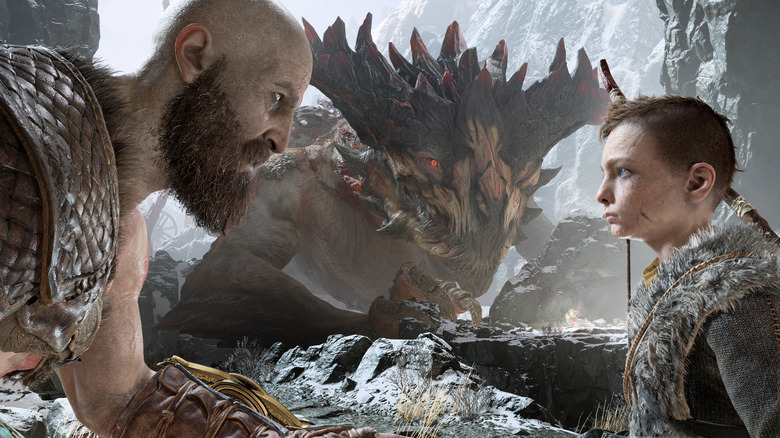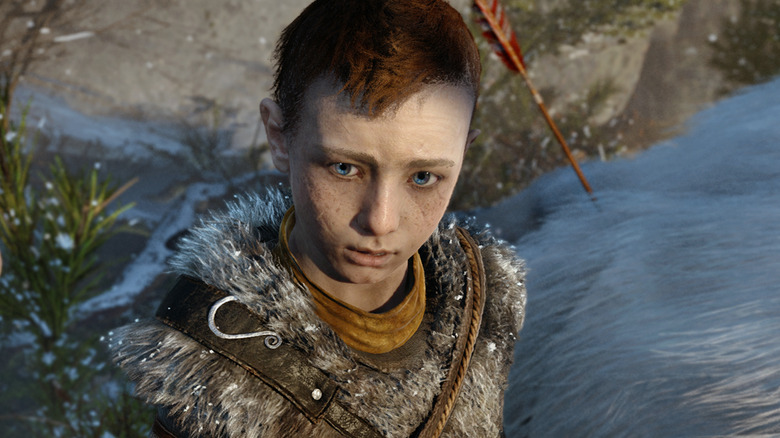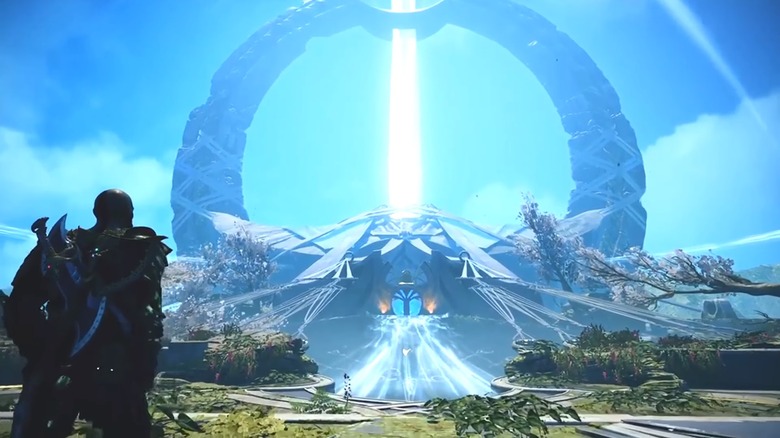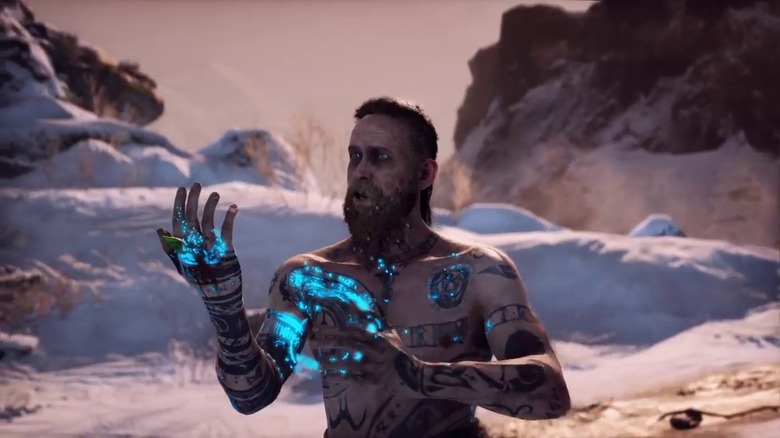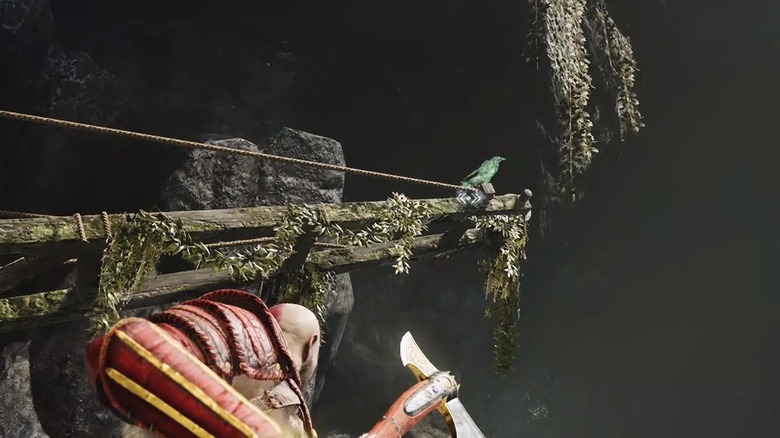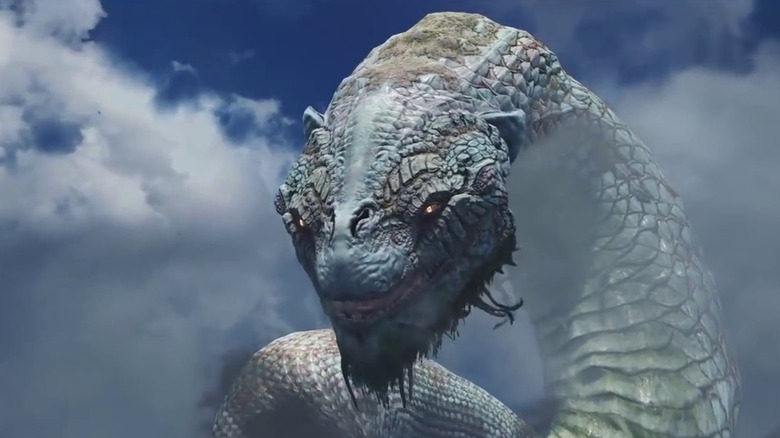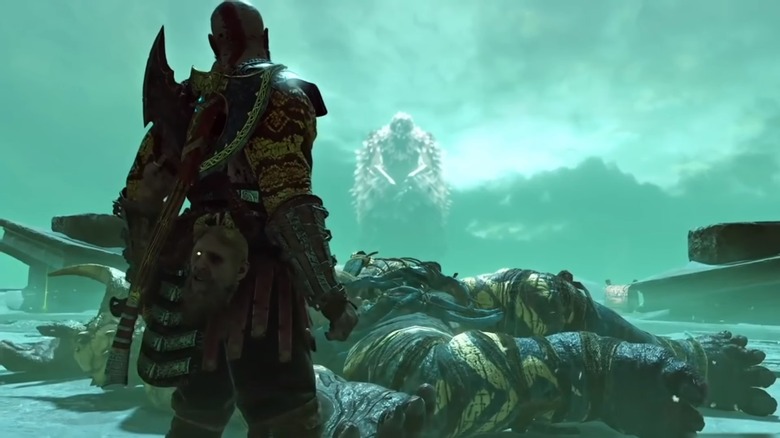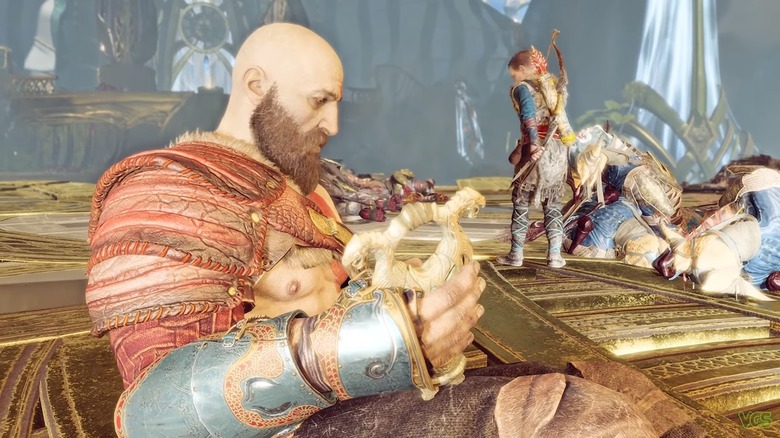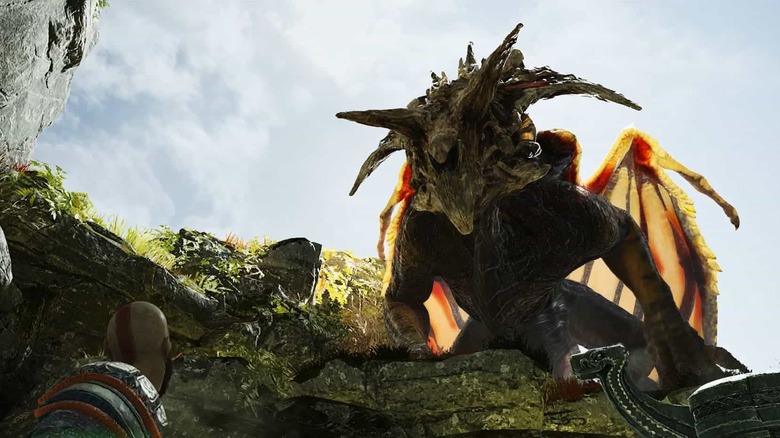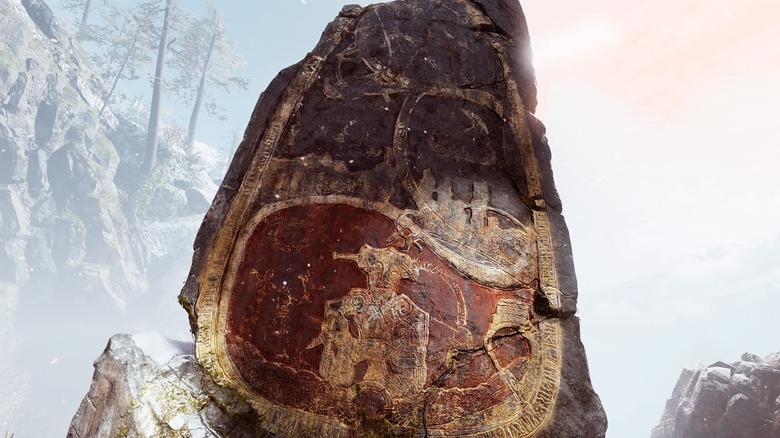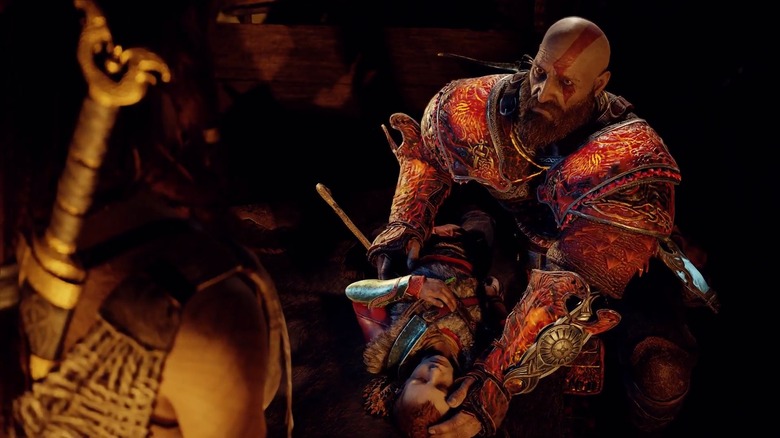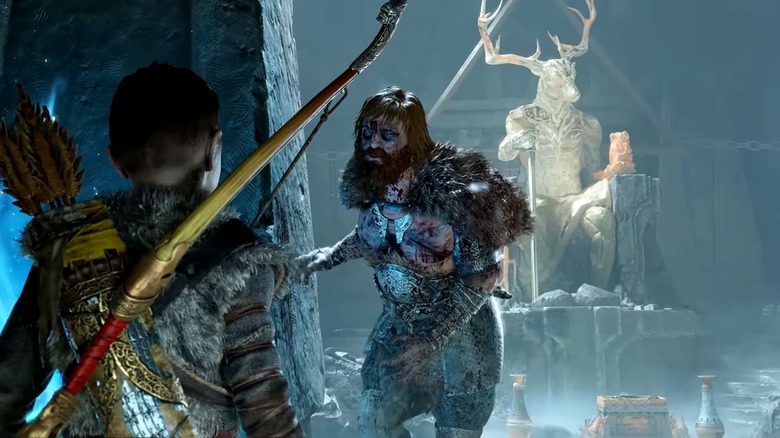Weird Mysteries That Never Made Sense In God Of War
Offering a thrilling story, well-developed characters, and stunning gameplay, God of War from Sony's Santa Monica Studio is one of the best titles to come out of 2018. Watching as Kratos wavers between a past of death and betrayal and his new role as a father and mentor is a rewarding experience, taking the franchise to promising and unexpected places.
The plot features twists and turns that will keep you guessing to the very end. The lore-rich world populated by a variety of dangerous creatures and enigmatic beings further complements this narrative. By the end of the game, father, son, and players alike have only scratched the surface of the complex world, paving the way for a hotly anticipated sequel.
Thrown directly into the action, you're left to piece together details of Kratos' new life and the challenges he encounters along the way. With so many intricate characters and storylines, the game leaves many questions unanswered, setting up the franchise for future installments.
Some mysteries God of War presents are stranger than the others. Set adrift in unfamiliar territory, often without context, the game leaves you to wonder about stray comments, references, and possible conspiracies. The amount of intrigue revealed through dialogue and codex entries is staggering, with some of the more interesting personas never appearing on screen.
With that in mind, here are the puzzling mysteries God of War has left unresolved.
Atreus' mental state
Atreus takes center stage amidst many of God of War's mysteries. His true identity was one of the biggest reveals of the game, raising several unanswered questions. A future title may resolve these loose threads, but there's a number of details that have fans scratching their heads.
During a poignant scene on the river with his father, angry voices beset Atreus, leaving him doubled over in agony. When the words and screams subside, the young protagonist describes an angry uproar, saying the presence "felt evil." Later, he confesses to his father he had heard voices before.
While in Helheim, when faced with a vision of himself killing Modi, Atreus responds, "That wasn't me." Though a possible display of boyish denial, the tone of the refusal implies he has no memory of committing the act.
So, what do these bizarre occurrences mean? Though Mimir says the voices may be a manifestation of Atreus's sprouting god-powers, the evil vibes raise a red flag or two. The implied gap in his memory hints at a bigger problem though, leaving players to wonder at his mental state.
Some believe these moments hint at a split personality, with the Loki representing his "evil" identity. Or maybe the outbursts and denial are the simply the side effects of a young god's transition from childhood into the highs and lows of adolescence. God of War does a good job of leaving the truth open to interpretation.
The fate of Freyr
One of the more enigmatic figures of the game, Freyr is Freya's brother and a leader of the Vanir. Though he doesn't make a direct appearance, God of War references him more than once.
According to the promotional podcast The Lost Pages of Norse Myth, Freyr worked to foster peace between his people and the Aesir tribes. Despite sharing his knowledge of magic and agriculture, the Aesir tried to burn Freyr alive. Though the god escaped, the incident led to the Aesir-Vanir war.
While pursuing the Light of Alfheim, Mimir reveals Freyr has strong ties to the elves. Beyond being one of few gods welcome in Alfheim, he has his own temple, a beautiful construction to rival the Seven Wonders of the real world.
Within the temple, Atreus discovers a note written by a Light Elf. In it, the author reveals they have retaken control of the Light of Alfheim. Though Freyr sent forces and his legendary sword, the god did not appear to offer aid in person.
Freyr's absence and involvement with both the Aesir and the elves raises a lot of questions. Where is he? Why does his sister say nothing about his absence beyond advising Kratos not to interfere in the Alfheim conflict?
After Kratos and Atreus defeat Svartáljǫfurr, the Dark Elf king, he tells them they've "made a grave mistake." Some believe this hints at a greater mystery but, with so many missing pieces, this puzzle remains unsolved.
The braided mistletoe arrows
In God of War, you fight Baldur, the game's primary antagonist, several times. After foreseeing his death, Freya, his mother, used magic to grant him invulnerability. While this made him one of the most formidable gods of the realm, the spell also removed his ability to feel anything.
Like all Vanir spells, this one had a weakness: mistletoe. Though inspired by the original Norse myth, you only discover this in-game when Baldur punches Atreus and cuts his hand on the mistletoe arrowhead holding the boy's quiver in place. This breaks the spell, making Baldur vulnerable and allowing him to feel again. A compelling story but one that raises several questions.
Atreus only had the arrow piece in his possession after receiving a bundle of mistletoe arrows from Sindri. Though given as a gift for saving his life, you have to wonder why the dwarf had mistletoe arrows in his possession. Why, out of everything he could have given Atreus, did he choose arrows made from the only material capable of hurting Baldur? Things get even messier when Freya later takes the arrows from Atreus and destroys them, yet, somehow misses the piece on his quiver.
As pointed out on Reddit, Sindri, despite popping up throughout the game, never appears when Freya is around. Was Sindri avoiding Freya because he knew of Baldur's weakness and wanted to break the spell through Atreus? It seems too convenient to be an accident.
The writings of the Raven Keeper
Three codex entries stand out among the bits of lore you gather during God of War, authored by an entity called the Raven Keeper. They speak of Odin sealing off travel to Asgard and Svartalfheim and also reference the World Serpent and Tyr's temple. In Norse mythology, ravens have a strong association with Odin, making it appear at first glance that he penned the documents. The game seems to support this as Odin sends icy ravens to act as his spies. Kratos can destroy these ravens, called the Eyes of Odin, as part of a side quest.
A closer examination of the phrasing used in the entries calls this assumption into question. First, the author refers to Odin by name, also mentioning his title, the Allfather. Second, he calls Thor "noble Thor," as though distinguishing he is Aesir royalty and thus of a separate class.
God of War portrays Odin as something of a paranoid megalomaniac drunk on his own power. For that reason, it's possible he might write about himself in the third-person. But if Odin didn't write the entries, then some other entity might be in play. Another look at Norse myth reveals Mimir may actually be the culprit as he gifted Odin with two magical ravens in exchange for his eye. Perhaps the truth will come out in the next game.
Who blew the horn in Midgard?
Jörmungandr, The World Serpent, inhabits the Lake of Nine, watching over Tyr's temple. According to Freya, Jörmungandr appeared in the lake one day and has remained there ever since. A horn nearby can be used to summon the serpent from the watery depths.
Kratos and Atreus encounter The World Serpent more than once during their adventures, even entering his belly to search for a misplaced statue. During the mission "The Sickness," Kratos rushes Atreus to Freya when he falls ill. While on the way to her hut, you hear the blow of the horn in the distance.
Though Mimir comments on the occurrence, the game never explains who blew the horn, leaving players to wonder why Santa Monica Studio included the detail. Several theories have cropped up, attributing the action to Modi, Thor, Baldur, Sindri, Odin, and even future Atreus.
A tweet from Cory Barlog added more fuel to the fire, posing the question, "Who would be walking in their footsteps looking for them?"
Inspired by Norse mythology, a favorite fan theory suggests Heimdall is the culprit and the horn in question is Gjallarhorn. Though Heimdall does not appear in the game, he has strong ties to both Mimir and Loki. The Prose Edda describes Gjallarhorn as having a blast that "can be heard in all the worlds" and says that Heimdall would blow upon it to signal the start of Ragnarok.
With Cory Barlog at the helm, the answer may be: "D) None of the above."
The giant bird in Helheim
Occasionally, you come across something in a game so disconcerting it's difficult to put into words. Enter the giant bird in Helheim.
Beyond its colossal size and location, what makes this creature so disconcerting is that it does little more than watch you go about your business. First, it's an imposing silhouette haunting the backdrop; next, it's flying up alongside your death ship, making you want to pack up and call it a day. The characters don't comment on the bird's presence, making the situation stranger still. No acknowledgements. No explanations. Just hundreds of feet of aerial predator observing your every move.
Who is this bird and why is he there? Borrowing from Norse mythology again, some fans believe they've found the answer. Hraesvelg ("Corpse Swallower") is a giant in the form an eagle who sits at the edge of the world. His perch overlooks Helheim and when he flaps his wings the winds blow. Others have suggested he is one of the three roosters whose crowing will warn the giants of the coming of Ragnarok (the "Ragnacocks" as Reddit has dubbed them). Interestingly, Heimdall blowing his horn is supposed to be the next step in the chain of events.
Either explanation could fit, but, that doesn't explain why the cast fails to react to the bird's presence. Perhaps they hoped by refusing to acknowledge him, he would go away. A reasonable response to something that may or may not be called the Corpse Swallower.
Atreus single-handedly kills dozens of Dark Elves
One of Atreus' major turning points occurs during the mission "The Light of Alfheim." After fighting their way to the center of the Dark Elf hive, Kratos enters the Light. Within, he experiences a sequence of visions over what, to him, seems like a handful of moments.
When Atreus pulls his father out of the light, you discover some time has passed, during which the boy had to fend for himself. In a heart-wrenching scene, Atreus yells at Kratos for leaving him behind again, demanding, "Why don't you care?" This confrontation happens amidst piles of Dark Elf corpses, hinting at how long Kratos left Atreus alone. Less clear is how Atreus managed to kill so many Dark Elves on his own, even with the Leviathan Axe in his possession.
The scene occurs earlier in the game, at a point when Atreus has no magic arrows. A few scenes back he had trouble hunting; now, you're meant to believe he dispatched waves of Dark Elves during a solo run. This comes after an entire mission of Kratos struggling to do the same to reach the Light in the first place.
Some players believe he went into survival mode, entering a prolonged period of rage that allowed him to kill so many opponents. With his heritage, it's possible he tapped into some hidden well of power. Others feel this further supports the split personality theory, or was his first step on the path to becoming Loki.
Dragon origins
As is common in fantasy settings, God of War features its own version of dragons, five of whom appear in the game. Atreus and Kratos encounter the first, Hræzlyr, by chance while climbing the highest mountain in Midgard. Baldur also has a dragon-mount, Dagsetr, he uses for transportation.
During the game, you unlock side quests that require you to find and free three imprisoned dragons: Fafnir, Reginn, and Otr. According to lore, an event called "The Greater Culling of the Wyverns" occurred centuries in the past, during which many dragons died. Who killed them and why remains unknown.
Similarly, the game provides little explanation about why these particular dragons were imprisoned beyond the shrines used to keep them captive. Completing the quests provides no further clues as the dragons simply fly off once you've freed them.
Fafnir, it turns out, was once a dwarf. He stole a Vanir mirror and then turned into a dragon after gazing into it. Further, in Norse mythology, Fafnir, Otr, and Reginn were all children of a sorcerer named Hreiðmarr. In the original myth, Fafnir, due to a cursed ring, was the only one of the three to turn into a dragon. Otr could transform into an otter, who Loki accidentally killed.
Though interesting, the myths make the entire situation more confusing. Were the three dragons once dwarven siblings? Were all the dragons once dwarves? If so, why did Hræzlyr attack Sindri? What is even happening in this storyline?
The prophecy hidden in plain sight
During the first Stranger fight, Kratos slams his attacker into a giant rock slab. A closer look at the slab reveals a mural that should look familiar if you've completed the game. Though faded, the mural is a duplicate of a portion of the prophetic images left by Faye predicting Kratos and Atreus's journey.
In a brilliant bit of foreshadowing, the section in question depicts the final battle against Baldur. You can also make out the World Serpent, the revived Thamur, and even a ship flying through Helheim. Though an interesting twist, the presence of the mural, not a mile from Kratos and Faye's home, raises some questions. Who created the mural and why, if it was so close, did Kratos never notice it?
It's possible Faye herself was the artist. The scenes shown might have captured some of her early visions; there may even be murals scattered elsewhere which she eventually formed into the final display discovered at the end of the game. Or, perhaps, this was the work of earlier giants or another being with foresight.
Neither explanation clarifies why Kratos did not discover the mural before his encounter with the Stranger. In this case, it may simply be a plot device or nifty Easter egg. In a world filled with gods, magic, and time travel, there isn't always a clear-cut explanation and you don't always need one. The fantasy genre benefits from a little mystique.
The true cause of Atreus' sickness
When Atreus' sickness hits its tipping point, Mimir attributes it to the mental strain of a god believing he's mortal manifesting as a physical affliction. Freya echoes this sentiment, agreeing that Atreus must know the truth of his identity to complete the healing process.
This explanation has left players wondering why Kratos did not exhibit similar symptoms before learning of his divine nature. As both Kratos and Atreus were born demigods, it seems odd only one of them would fall prey to the side effects of their subconscious conflict. It's possible Atreus' illness may result from his blend of human, giant, and divine ancestry. Still, this explanation feels patchy, with the scenario simply serving as the catalyst that forces Kratos to reveal Atreus' real origins. It's also a convenient way to send the pair back to Freya, setting up the big reveal towards the end of the game.
The differences in Kratos and Atreus' upbringings may also provide insight. As a Spartan, Kratos was trained to be a fearless warrior; from birth, his life held no room for fear or doubt. On the other hand, Atreus grew up free of the ravages of war, though he lived in his father's shadow. Buckling under the weight of this comparison may have placed too much additional strain on his psyche, intensifying the conflict between his mortal upbringing and divine nature.
Modi's new brother
Sadistic, crude, and predatory, Modi and his dialogue are often cringe-worthy. The son of Thor, he and his brother, Magni, were in constant competition to claim the right to wield Mjölnir, their father's hammer. You might almost feel sorry for him if his every word and action weren't so revolting. After fleeing and leaving his brother to die at the hands of Kratos, Thor sent Modi to exact revenge but not before giving his cowardly son several severe beatings. During the ensuing fight, Modi goads Atreus and Kratos by insulting Faye, calling her ugly and a whore, among other tasteless barbs.
While attacking Kratos, Modi tells Atreus he will be his "new brother," an odd statement that has left players to speculate about its true meaning. After years of living in his brother's shadow and cultivating his cruel nature, it's possible the words were the manifestation of a deranged and broken mind. Thor clearly was not the most positive role model, with his grandfather, Odin, providing an even worse example.
Earlier in the game, Modi asked Magni if he could get "the kid" when they went up against Atreus and Kratos. The request reinforces that, more than anything, Modi wants to feel powerful. With this in mind, Modi's comment about making Atreus his "new brother" may betray even darker appetites. This is one mystery that may be best left unsolved.

